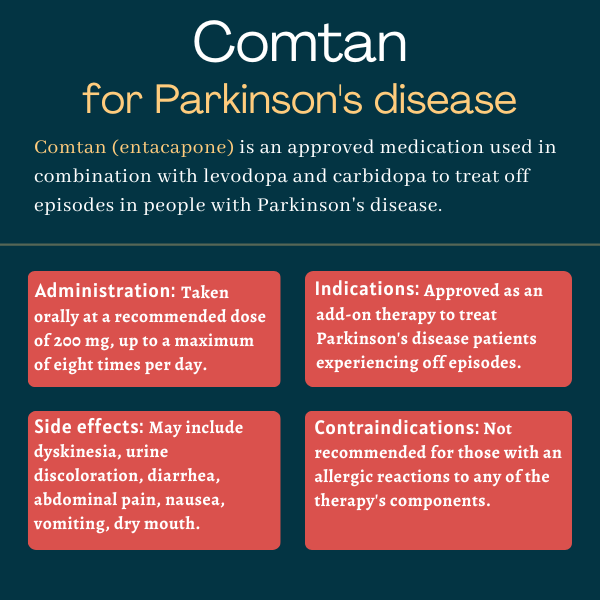Comtan (entacapone) for Parkinson’s disease
What is Comtan for Parkinson’s disease?
Comtan (entacapone) is an approved oral therapy used in combination with carbidopa and levodopa to treat off episodes in people with Parkinson’s disease. Off episodes are periods when a medication wears off and disease symptoms return between doses.
Originally developed and manufactured by Orion Pharma, the medicine is distributed in the U.S. by Almatica Pharma.
Therapy Snapshot
| Brand Name: | Comtan |
| Chemical Name: | Entacapone |
| Usage: | Used as an add-on therapy to treat off episodes in Parkinson’s disease |
| Administration: | Oral tablets |
How does Comtan work?
Parkinson’s disease is characterized by the progressive degeneration of brain nerve cells responsible for generating dopamine, a chemical messenger vital for transmitting signals between nerve cells and for facilitating muscle movement.
Levodopa stands as the primary treatment for Parkinson’s, alleviating motor symptoms as it is converted into dopamine. This conversion process increases dopamine levels within the brain.
However, as the disease progresses, patients’ responses to levodopa generally diminish over time. This frequently gives rise to off episodes, during which patients experience flares of symptoms between doses of levodopa.
As such, the therapy is commonly combined with compounds that inhibit the function of DOPA decarboxylase (DDC) and catechol-o-methyl transferase (COMT), two enzymes responsible for transforming levodopa into dopamine within the body prior to its arrival in the brain.
These combinations increase the amount of levodopa reaching the brain, reducing the required doses of levodopa and easing related side effects. Carbidopa is the most common DDC inhibitor used together with levodopa.
Comtan is a COMT inhibitor. By blocking the COMT enzyme, the compound maintains levodopa levels in the blood, resulting in a continuous stimulation of brain cells that leads to an increase in levodopa’s effectiveness.
Who can take Comtan?
Comtan was approved by the U.S. Food and Drug Administration in 1999 as an add-on treatment for Parkinson’s patients on levodopa and carbidopa therapy who experience end-of-dose motor fluctuations, or off episodes.
In Europe, Comtan was approved in 1998 to be used in combination with levodopa and carbidopa or levodopa and benserazide — another type of DDC inhibitor — for adult Parkinson’s patients who are experiencing end-of-dose motor fluctuations and cannot be stabilized on those combinations.
Who should not take Comtan?
Comtan is contraindicated, or not recommended, for anyone who has experienced an allergic reaction to either the therapy itself or any of its components.
It’s generally not recommended that patients take both Comtan and a nonselective MAO inhibitor, which is commonly used to treat depression. Using these medications together could potentially lead to the disruption of normal metabolism.
The medication also should not be used in people with a major psychotic disorder, as treatment might exacerbate any existing conditions, and individuals with liver disease should be treated with caution.
How is Comtan administered in Parkinson’s?
Comtan is available in the form of oval film-coated tablets that are brownish-orange in color and contain 200 mg of the medicine’s active ingredient. These tablets, designed for oral administration, bear the inscription “Comtan” on one side.
The recommended dose is one 200 mg tablet taken with each levodopa and carbidopa dose, up to a maximum of eight times per day (totaling 1,600 mg daily). There is limited clinical experience with doses exceeding 1,600 mg per day.
Adjustments to the daily levodopa dose or the intervals between doses might be required to enhance an individual patient’s response. In clinical trials, most patients needed to reduce their daily levodopa dose if they were taking 800 mg or more each day or had moderate to severe dyskinesia — abnormal, involuntary movements — before starting the treatment.
Comtan works with both immediate and extended-release forms of levodopa and carbidopa, and can be taken with or without food.
If a decision is made to stop Comtan treatment, patients should be closely monitored and the dose should be gradually reduced. Also, adjustments to other dopaminergic treatments must be considered.

Comtan in clinical trials
Comtan’s effectiveness as an add-on therapy to treat Parkinson’s disease was shown in several placebo-controlled studies. In three of these studies, patients experienced motor fluctuations despite being on optimal levodopa therapy. In another two studies, patients without these fluctuations also were included.
Trials in fluctuating patients
In one study, called NOMECOMT, 171 Parkinson’s patients in Nordic countries were randomly assigned to receive either a placebo or 200 mg Comtan. Each took one tablet alongside each dose of levodopa and carbidopa or levodopa and benserazide. The dosing occurred up to 10 times a day, with an average of four to six doses daily, for six months.
The participants kept records of their time spent feeling on, or functioning well, and off in daily diaries at home throughout the study. The main goal of the study was to measure the average time patients spent in the on state during an 18-hour day.
The patients’ home diaries showed that Comtan increased mean on time by 1.5 hours, while reducing mean off time by about 1.3 hours. A noticeable improvement was reported by patients in the benefits they got from their daily levodopa dose when they took Comtan, which was accompanied with levodopa dose reductions. The group taking Comtan needed significantly less levodopa daily — around 102 mg less than the placebo group. When patients stopped taking Comtan, the increased benefit from levodopa mostly disappeared.
Motor function and activities of daily living, as assessed using the Unified Parkinson’s Disease Rating Scale (UPDRS) parts 2 and 3, also improved significantly more with Comtan than with a placebo. Comtan was found superior to a placebo at improving the participants’ clinical condition, as determined by the investigators.
In another study, called SEESAW, 205 patients in the U.S. and Canada were randomly given either a placebo or Comtan 200 mg alongside each levodopa and carbidopa dose. As in the previous trial, they took these doses up to 10 times a day, with an average of four to six doses daily, for six months.
These patients also noted their on and off periods in daily diaries at home. The main goal of this trial was how much of the day patients spent in the on state while awake, over a 24-hour period.
In the overall patient population, Comtan significantly increased on time by about one hour, and the drug’s benefits became more apparent as the day went on. However, the medication had a much stronger effect in patients with less than 55% on time during the day, in whom it increased on time by about two hours. A significant increase in on time was not observed in those who already had 55% or more on time.
Patients on Comtan had a significant reduction in their daily off time compared with those on placebo. Specifically, the reduction was 1.2 hours less for Comtan versus 0.3 hours less for the placebo. Yet, as in the previous study, when patients stopped taking Comtan, the increased benefit from levodopa disappeared. Indeed, individuals who stopped the treatment experienced a significant worsening of motor fluctuations.
In general, Comtan use led to significant improvements on total UPDRS scores, especially in motor function and activities of daily living subscales. This positive impact tended to grow as time went on. On average, the daily levodopa dose decreased by around 100 mg in the Comtan group, and most of this reduction happened in the first four weeks, or about one month, of treatment. Comtan also was found to work better than the placebo in the global assessment of clinical condition by both investigators and patients.
One Japanese study evaluated two doses of Comtan, specifically 100 or 200 mg, in 341 Parkinson’s patients with an average history of 3.5 years of wearing-off motor fluctuations during levodopa and DOPA decarboxylase inhibitor therapy.
Its main outcome measure was the change in absolute on time, which increased significantly, by 1.4 hours, with both Comtan dose regimens, compared with 0.5 hours for those on a placebo group. The 100 mg dose had a slightly lower rate of adverse events (72.6%) compared with the 200 mg dose (86%) but it was still higher than that of the placebo group (70%).
Trials in fluctuating and non-fluctuating patients
Although Comtan hasn’t been thoroughly tested in Parkinson’s patients who don’t experience motor fluctuations, a study called CELOMEN included a small group of patients in Europe who did not experience off periods.
A total of 301 patients in Germany and Austria were randomly given either a placebo or Comtan 200 mg alongside each levodopa and carbidopa or levodopa and benserazide dose, up to 10 times daily for six months. Motor function and activities of daily living, as assessed by the UPDRS parts 3 and 2 scores, respectively, as well as total daily on time were the study’s main goals.
In the whole population, both activities of daily living and motor scores significantly improved among those taking Comtan, relative to a placebo. In patients with motor fluctuations, Comtan significantly increased on time (by about 1.7 hours vs. 1 hour with the placebo) and reduced off time (by 1.5 hours) compared with the placebo. Additionally, Comtan led to a reduction of 54 mg in the daily levodopa dose, while the placebo group increased it by 27 mg.
In the 41 patients without motor fluctuations, those receiving Comtan also experienced a reduction in levodopa dosage, by 24 mg, whereas those in the placebo group saw an increase of 2 mg. The therapy also improved activities of daily living and motor scores in this population, while those on the placebo experienced worsening in those scores, but the differences failed to reach statistical significance.
The benefits of Comtan were lost upon discontinuation. Comtan’s efficacy was similar for patients using both controlled-release and standard levodopa preparations.
In another study, a total of 172 patients with motor fluctuations and 128 patients without fluctuations, all in the U.K. and Ireland, were given Comtan 200 mg or a placebo alongside each daily levodopa dose, up to 10 times a day.
For patients with motor fluctuations, the main measure of effectiveness was the proportion of daily on time, which significantly increased compared with the placebo. On average, patients gained an extra 1.2 hours of on time, and their daily off time decreased by about 1.1 hours.
This improvement occurred even though the daily levodopa dosage was decreased. However, there were no differences between the Comtan and placebo groups in scores of motor function and activities of daily living. Also, when Comtan was stopped, the benefits were quickly lost.
In patients without motor fluctuations, the main goal was to measure activities of daily living using part 2 of the UPDRS. In this group, those taking Comtan saw a significant improvement in their daily living scores. These patients also remained on fairly stable levodopa doses during the trial, while those on the placebo increased their dose by 47 mg.
Common side effects of Comtan
The most common side effects observed in clinical studies include:
- uncontrolled, involuntary movements, known as dyskinesia and hyperkinesia
- urine discoloration
- diarrhea and abdominal pain
- nausea
- vomiting
- dry mouth.
Interaction with medicines metabolized by COMT inhibitors
Because Comtan blocks the function of the COMT enzyme, the therapy may interfere with the metabolism of other medications that are broken down by this enzyme. These medications should be given with caution in patients on Comtan, as combining them may lead to changes in heart rate, arrhythmias, and increases in blood pressure.
Falling asleep during daily activities
Some patients receiving Comtan have reported increased sleepiness and suddenly falling asleep without warning while doing their normal daily activities. It’s important that healthcare providers discuss with their patients any risk factors for increased sleepiness, such as sleep disorders and other coprescribed medications.
If patients experience increased sleepiness or fall asleep suddenly, Comtan discontinuation should be considered. Should these patients decide to continue taking the medication, they are advised to avoid activities like driving that could be dangerous if unexpected sleep episodes occur.
Low blood pressure and fainting
Treatment with Comtan may lead to episodes of low blood pressure when rising from sitting or lying down, a phenomenon known as orthostatic hypotension. This can increase the risk of fainting.
Hallucinations, psychosis, and impulse control
Comtan can trigger effects such as hallucinations (seeing or hearing things that aren’t real), psychotic behavior, and impulse control problems like gambling or heightened sexual urges.
Those with a significant psychotic disorder should avoid Comtan treatment due to the potential of worsening their psychosis. Patients who experience impulse control disorders while on Comtan should evaluate the need to reduce or discontinue their treatment.
Diarrhea and intestinal inflammation
Diarrhea has been experienced by patients treated with Comtan and usually occurs four to 12 weeks after starting treatment. However, it can appear as early as two weeks or as late as several months after treatment initiation. Diarrhea might be linked to weight loss, dehydration, and low potassium levels in the blood.
This side effect also could indicate drug-related microscopic colitis, a type of inflammatory bowel disease that primarily affects the large intestine. While discontinuing treatment generally resolves these symptoms, all cases of persistent diarrhea should be followed up with an appropriate evaluation.
Dyskinesia
Because it increases the amount of levodopa available in the body, treatment with Comtan can lead to or worsen existing dyskinesia — uncontrolled, involuntary movements that can occur in Parkinson’s patients. Decreasing levodopa doses may help manage this side effect, but will not completely eliminate dyskinesia in many patients.
Muscle injury
Treatment with Comtan has been associated with severe cases of muscle breakdown, known as rhabdomyolysis. This could result from prolonged and intense muscle movements, such as dyskinesia, or from a high fever due to abrupt treatment discontinuation.
High fever and confusion
High fever, rigid muscles, and confusion have been reported after rapidly decreasing the dose or stopping the use of Comtan. Lowering the dose or discontinuing the medication should be a gradual process overseen by a healthcare professional.
Tissue scarring complications
Complications linked to tissue scarring, such as fluid buildup between lung-covering membranes, thickening of those membranes, and scar tissue in the back of the abdominal cavity, have been noticed in patients using dopaminergic treatments, including instances involving Comtan use. While stopping the therapy might help in addressing these problems, complete resolution is not always certain.
Melanoma
People who have Parkinson’s disease have an increased susceptibility to develop melanoma, a type of skin cancer. Nonetheless, the precise reason for this elevated risk is not definitively known and could be related to the disease itself or other factors such as medications. To address this risk, individuals undergoing Comtan treatment are recommended to have routine skin check-ups to promptly identify any indications of melanoma.
Liver and kidney impairment
In animal studies, treatment with Comtan caused certain damages to kidney structures, but there is not enough evidence to know if this is applicable to humans. For patients with liver problems, caution is advised during treatment as liver disease may lead to significant increases in Comtan’s levels in the blood.
Use in pregnancy and breastfeeding
There is limited research data regarding the use of Comtan in pregnant patients. Findings from animal studies suggest it may cause harm to a developing fetus, implying that its usage during pregnancy should be subjected to careful consideration. The potential advantages should be balanced against conceivable risks for both the mother and the child.
Although there is a lack of data examining the presence of Contam in human milk, traces of its active ingredient entacapone have been identified in rat breast milk. As such, caution is recommended when administering Comtan to patients who are breastfeeding.
Patients who are pregnant or planning pregnancy, and those who are nursing or contemplating breastfeeding, should discuss this issue with their healthcare providers.
Parkinson’s News Today is strictly a news and information website about the disease. It does not provide medical advice, diagnosis, or treatment. This content is not intended to be a substitute for professional medical advice, diagnosis, or treatment. Always seek the advice of your physician or other qualified health provider with any questions you may have regarding a medical condition. Never disregard professional medical advice or delay in seeking it because of something you have read on this website.
Recent Posts
- Bezisterim clinical trial uses hybrid design to promote accessibility
- Parkinson’s advocacy groups call for ‘robustly funded, collaborative NIH’
- I may be overprotective, but it’s progress, not perfection
- Living with Parkinson’s reminds me what friends are for
- Copper supplementation shows promise in Parkinson’s mice
FAQs about Comtan
The U.S. Food and Drug Administration approved Comtan in December 1999 as an add-on treatment to levodopa and carbidopa in Parkinson’s patients experiencing off episodes, or periods of time when medication wears off and disease symptoms return between doses.
The safety of Comtan use during pregnancy is still unclear. Although animal studies suggest potential harm to a growing fetus, there is a shortage of clinical information examining its impact on pregnant human patients. If individuals with Parkinson’s intend to become pregnant while taking Comtan, they should consult with their healthcare provider about possible risks or concerns related to the medication.
When using Comtan, people might feel very sleepy or unexpectedly fall asleep while doing their normal daily activities. To stay safe, patients should avoid driving or other tasks that may be potentially dangerous if they fall asleep until they know how the medication affects them. If they experience these side effects, patients should speak with a doctor.
Comtan was seen to prolong the clinical effect of each levodopa dose as soon as after its first administration. In clinical studies, Comtan led to increases in daily on time as early as after two weeks, and those benefits became significantly greater than with a placebo after about eight weeks. However, because Parkinson’s disease varies from person to person, and not everyone responds the same way to Comtan, the time it takes to see its benefits also will vary.
Hair loss and weight gain were not reported as side effects of Comtan in clinical trials. However, weight loss might occur as a consequence of diarrhea, a common side effect of the medication, and weight gain may occur if patients develop an intense urge to binge eat. Patients should talk with their healthcare provider if these or any other unexpected events occur.
Related Articles

 Fact-checked by
Fact-checked by 







